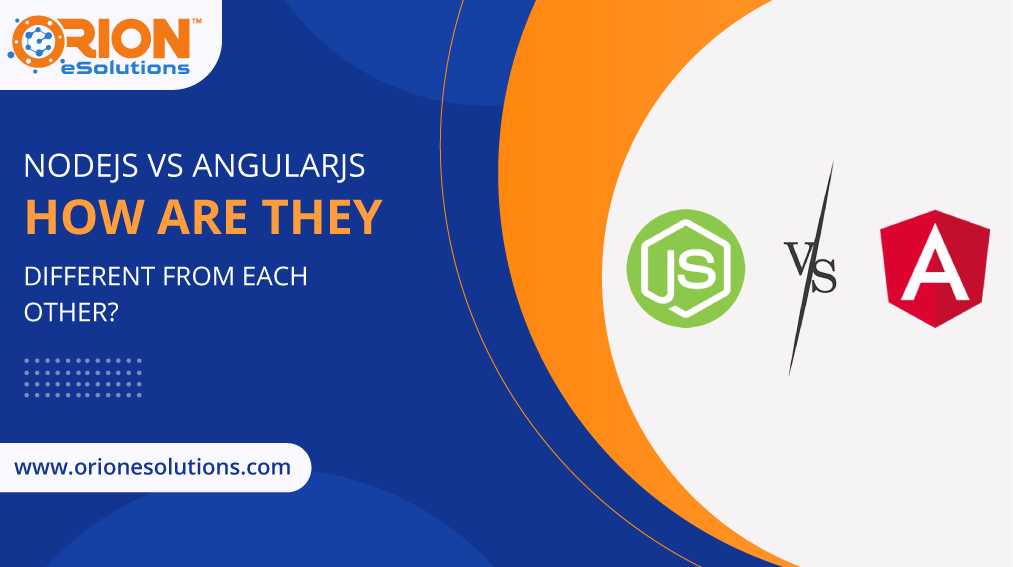JavaScript has developed way beyond than just being a regular client-side scripting language. It is regarded as an immensely effective and powerful programming language that can be used to create both the server-side applications and the traditional client-side applications.
AngularJs and NodeJS are used for making efficient client-side and server-side web applications. Both these frameworks help in creating interactive and feature-rich cross-platform web applications. They are widely used open-source JavaScript-based technologies.
Where AngularJS is a JavaScript framework, NodeJS is a cross-platform runtime environment. Being a client-side JavaScript framework, AngularJS allows creating dynamic web applications that are dependent on the model view controller architectural pattern and HTML as a template language. As opposed to this, NodeJS assists the programmers to create scalable server-side applications utilizing JavaScript as a server-side programming language.
Therefore, NodeJS and AngularJS differ from each other in functionality, performance, usage, architecture, etc. In this blog, we are going to see an in-depth comparison between NodeJS vs Angular. So, let’s begin:
AngularJS
As a JavaScript framework, AngularJS is an open-source web application framework that is managed by Google. It can be added to an HTML page with a <script> tag and it extends the HTML attributes with directives while binding data to HTML with expressions.
AngularJS enables the users in adding dynamic views into their web application and is also integrated with the model view controller architecture. This particular feature has enabled AngularJS to be one of the most preferred frameworks when it comes to creating data-driven and interactive web applications.
HIGHLIGHTS
- AngularJS is a framework written in the JavaScript language.
- It is useful in managing the state of models
- It is easily integrated with other UI tools
- It helps to manipulate the DOM architecture easily.
- AngularJS enables users to write custom HTML codes.
- It is useful for JavaScript developers for creating dynamic web applications quickly.
NodeJS
NodeJS is a cross-platform, open-source runtime environment that is used for developing server-side networking applications. The applications made using Node.js are written in JavaScript and they can run mostly within the Node.js runtime. It offers a rich library of JavaScript modules that simplifies the process of web application development to a large extent.
In simple terms, NodeJS is considered to be an ideal framework for developing server-side, scalable and data-intensive web applications.
HIGHLIGHTS
- Node.js is open-source and a free runtime environment that can be downloaded at any time and by anyone.
- It enables the developers to perform some important non-blocking operations while enhancing the complete performance of a web application.
- It provides the facility of unit testing called Jasmine that assists in testing the code written by the developers.
- Node.js comes built-in with many APIs that allow the developers to make different kinds of servers such as TCP server, DNS server, HTTP server, etc.
- The developers can scale a Node.js application in vertical and horizontal form while improvising the performance significantly.
HOW NodeJS & Angular ARE DIFFERENT FROM EACH OTHER?
- FUNDAMENTAL DIFFERENCE: The most important difference between NodeJS and Angular is that NodeJS is a cross-platform runtime environment for web applications written in the JavaScript language and the developers need to install on the computer system. It is written in JavaScript, C, and C++ and it supports non-blocking input/output API and event-driven architecture. Whereas, AngularJS is an open-source web application development framework that is developed by Google. Written entirely in the JavaScript language, it enables extending HTML syntax for describing the components of an application. The developers just need to add AngularJs files like any other JavaScript file to use in applications.
- CORE ARCHITECTURE: Developed by Google as a web application development framework, AngularJS is written entirely in the JavaScript language. In addition, it also follows the JavaScript syntax rules. Alternatively, NodeJS is a cross-platform runtime framework that is based on the V8 JavaScript engine of Google. It was written in multiple programming languages such as C, C++, JavaScript, etc.
- INSTALLATION PROCESS: The web developers have the capability to write the NodeJS application in the JavaScript language. However, the applications are supposed to run within the runtime environment on different platforms. Therefore, the web developers are required to install NodeJS on their computer systems while creating the development environment. As opposed to this, the web developers do not have to install AngularJS on their computer systems. They have the ability to embed the Angular files into the codebase just as they do with any other JavaScript files.
- MANAGING DATA: Not only does AngularJS implement the MVC architecture in a different way, but it also supports two-way data binding. The two-way data binding keeps the data between a web application model and view components completely synchronized. However, AngularJS does not offer any feature for writing the database queries. In contrast to this, NodeJS enables the programmers to generate some database queries in JavaScript language. Therefore, it becomes much simpler for the programmers to create database queries for the non-relational databases such as MongoDB and CouchDB with the help of overcoming syntactical differences.
- SIGNIFICANT FEATURES: As such, both NodeJS and Angular support the MVC architecture pattern. However, both of them come with a different set of significant features that make them different from one another.
AngularJS allows the programmers to use HTML in the form of a template language. Additionally, it also allows the developers to express various components in a web application with the help of extending the HTML syntax. It makes the development of a single page and dynamic pages much simpler with features like scope, directives, filters, templates, routing, deep linking, dependency injection, etc. As opposed to this, NodeJS is a server-side framework that offers a wide range of features required by the developers for creating server-side and networking applications. Furthermore, the developers can make the most of multiple features offered by NodeJS which finally helps in simplifying the web development of single-page websites, video streaming websites, and Input-Output intensive web applications. Additionally, NodeJS also helps the programmers to use a single-threaded event mechanism and asynchronous API at the time of improving code execution. The web developers can also use NodeJS for enabling web applications to deliver data quickly without any buffering. - COMMON USES: Angular is mostly used by the JavaScript developers for creating a single page and client-side web applications. This highlight provided by the web framework makes it very easy for programmers to build interactive and real-time applications. As opposed to this, NodeJS is used by the developers for creating fast and scalable server-side networking applications. The advantage of a cross-platform runtime environment that is provided to the developers helps in building real-time applications with collaborative editing.
CONCLUSION
In conclusion, NodeJS and Angular are both open source projects that have a prime objective to build web applications with the help of JavaScript. Although their architecture and working model is pretty different, both of them have extensive features that can be used to make a wide variety of applications.
The difference between Angular and NodeJS is that AngularJS is suitable for developing single-page applications that are both dynamic, interactive in nature. Whereas, NodeJS is a server-side framework that offers a runtime environment for applications that are real-time and data-intensive.
When it comes to choosing between AngularJS and NodeJS, the application requirements must be kept in mind. If the developers need to build server-side applications, they should choose Node.js and when they want to create single-page client-side web applications, they should go for choosing Angular.








